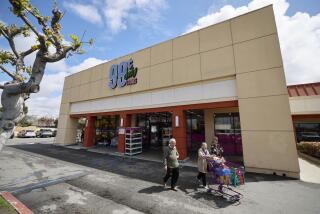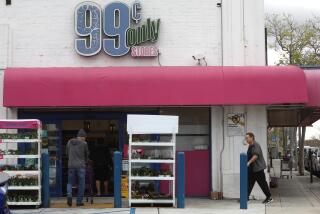New Owners Try to Fix Whittled-Down Holiday Hardware : Retailing: Former managers pick up the pieces at stores in Valencia and Simi Valley. They’ll continue to stress service and convenience.
- Share via
Until last summer, six independent Holiday Hardware stores dotted the Southland from Granada Hills to Seal Beach. Today, only two stores in the 37-year-old chain remain--in Valencia and Simi Valley. The others were victims of the recession and competition from bigger warehouse and home-improvement centers such as Home Depot.
By last summer, Holiday Hardware’s sales had dived 30% from their 1990 peak and the chain was $1 million in debt.
So Frank Redlich, 67, who founded the chain, liquidated four of his stores to pay Holiday’s creditors (mostly vendors) and unhappily retired.
What’s left of Holiday Hardware now rests with its new owners, Marshall Shrago and Darryl Minor, former managers of the Valencia and Simi Valley stores.
Those stores were still profitable when the other four closed last summer, and the two stores remain profitable, Shrago said.
Shrago and Minor bought the Valencia and Simi Valley stores from Holiday’s creditors committee for less than $200,000, Shrago said.
Shrago and his partner, who took over the Holiday stores in September, aren’t changing a thing, from the stores’ locations--in shopping centers with busy supermarkets--to the mix of housewares as well as hardware they carry.
The new owners are hopeful they can match the slightly more than $1 million in annual sales each of the two stores had last year, with about a 4% profit.
That was about the average in sales for independent hardware stores in 1992, according to the National Retail Hardware Assn., an Indianapolis-based trade group that represents 17,000 of the nation’s 30,000 independent stores.
Shrago said he expects the Valencia and Simi Valley Holiday stores, renamed the New Holiday Hardware Corp., to benefit from a consolidation in the industry that is eliminating some of the big national chains that pioneered the concept, such as Builders Emporium.
After more than 20 years in business, Irvine-based Builders Emporium closed its dozens of stores earlier this year.
The consolidation is dividing the retail hardware industry into two segments: neighborhood stores under 20,000 square feet such as Holiday, and the surviving warehouse giants with 100,000 square feet or more.
While the big warehouses will continue to compete on price and selection, the corner hardware stores are re-emphasizing service and convenience.
“Holiday has always been known for the kind of old-fashioned, personal service you don’t get at the big warehouse stores,” Shrago said. “We’re working very hard to keep that reputation.”
By being located near supermarkets, “we also make it easy for people to stop in and pick up something they need when they do their grocery shopping--sort of the 7-Eleven of hardware.” Neighborhood hardware stores have been disappearing for years, unable to compete with the huge inventory and discounts offered by hardware and home-improvement warehouse operators.
Today, the largest player in that segment of the industry is Home Depot with 260 stores, or about 9% of the market, according to analysts, who expect the company’s sales to be close to $10 billion this year.
Builders Square, a division of Kmart, has about 188 stores and nearly $3 billion in sales. HomeBase, headquartered in Fullerton, with 90 stores, rings up almost $2 billion in annual sales.
Ironically, these and other fast-growing national hardware chains, such as Lowe’s Cos. and Payless Cashways, have forced out some of the industry’s pioneers--notably Builders Emporium--by offering customers even deeper discounts.
Holiday Hardware got its start in 1956, when Westlake Village resident Redlich opened his first store in Granada Hills.
He says he named it for jazz singer Billie Holiday, whom he admired.
Over the years, as Redlich added more stores, he stayed with the same product mix: dishes, pots and pans and other housewares, as well as Black & Decker tools, Dutch Boy paint, bins of nuts and bolts and chicken wire by the yard.
“We were successful for 30-odd years until the recession hit, combined with competition from the large retailers,” Redlich said.
As dual hardware-housewares stores, the Holiday chain couldn’t compete with its much larger rivals in both segments of its business.
“In hardware, the big warehouses took away a little bit of our business every year, and in housewares, it was Price Club, Target, Pace, Kmart and all those powerful chains,” Redlich said.
He said Holiday’s prices averaged 5% to 6% higher than those stores.
By 1990, Redlich had built the private company’s annual sales to a peak of about $6 million. But then the slump began.
The new owners’ plan is to stick with Redlich’s original formula of offering Holiday Hardware customers better service and convenience in exchange for prices that are slightly higher than the discounters.
There are already some big home-improvement stores in Valencia and Simi Valley. A new Home Depot in Valencia will join them early next year and Shrago is understandably eyeing it warily.
“We knew about it when we bought the stores,” he said. “It certainly isn’t going to help us. But we’ve had good support from the community, so we’ll stick to what we do.
Shrago adds, “We have stepped up our advertising. Right now, we’re just trying to answer the question, is Holiday Hardware still open? We want everybody to know it sure is.”
More to Read
Inside the business of entertainment
The Wide Shot brings you news, analysis and insights on everything from streaming wars to production — and what it all means for the future.
You may occasionally receive promotional content from the Los Angeles Times.










